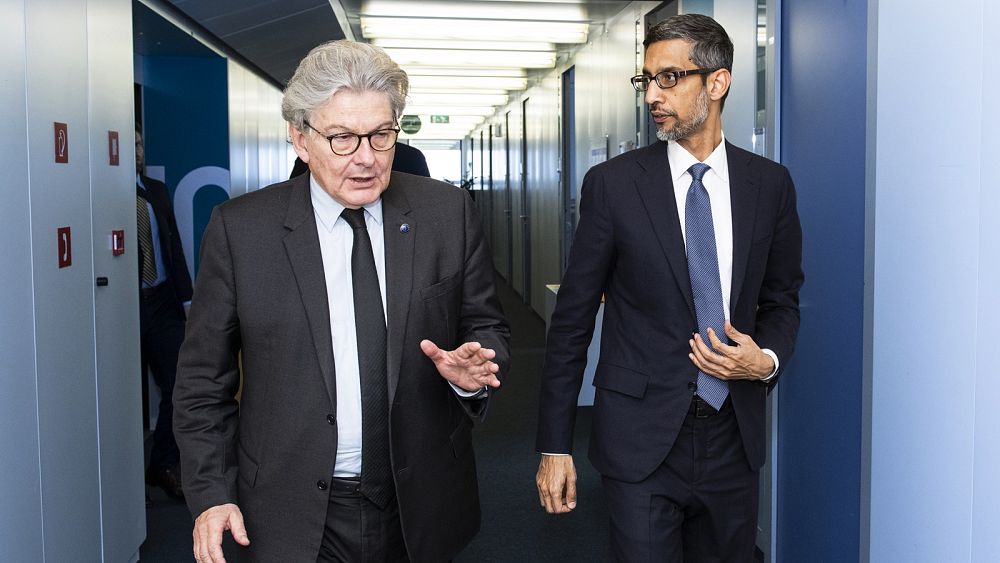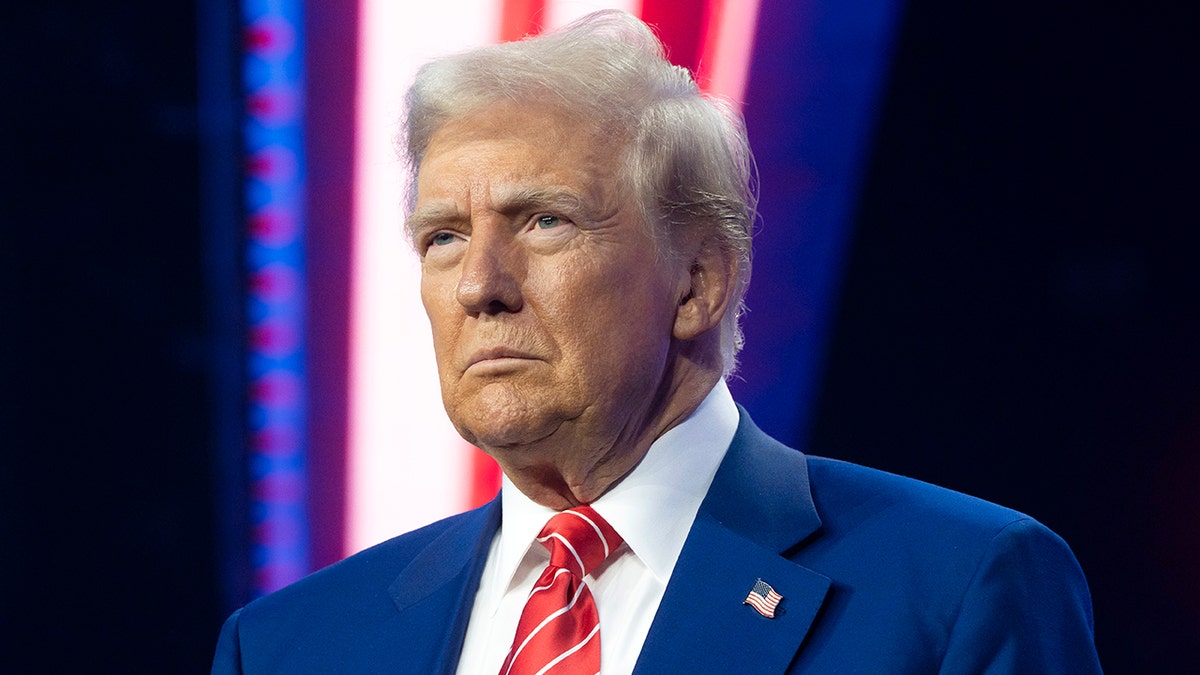World
Brussels and Google pitch voluntary AI pact to fill legislative gap

EU legislators are currently negotiating the Artificial Intelligence Act, but the legislation could take up to three years to be fully applicable.
The European Commission and Google have committed to crafting a voluntary pact for artificial intelligence to mitigate the gravest risks associated with this rapidly evolving technology until proper legislation is put in place.
The pledge was announced after Google CEO Sundar Pichai met with several European Commissioners during a visit to Brussels, where the topic of AI featured prominently in the conversations.
“We expect technology in Europe to respect all of our rules, on data protection, online safety, and artificial intelligence. In Europe, it’s not pick-and-choose,” Thierry Breton, European Commissioner for the internal market, said on Wednesday, according to a short read-out.
“Sundar and I agreed that we cannot afford to wait until AI regulation actually becomes applicable, and to work together with all AI developers to already develop an AI Pact on a voluntary basis ahead of the legal deadline.”
The voluntary pact, whose specific details are still unclear, will involve “all major” companies working in the AI field, both from in and outside Europe, Breton added.
Google did not immediately reply to a request for comment.
Although AI has long been on the policy radar of Brussels, the market explosion of ChatGPT, the chatbot developed by OpenAI, has jolted the debate and put so-called foundation models under the microscope.
Foundation models are those trained with vast troves of data, such as text, images, music, speech and code, with the goal of fulfilling an ever-expanding set of tasks, rather than having a specific, unmodifiable purpose.
Chatbots like OpenAI’s GPT and Google’s Bard are some of the early examples of this technology, which is expected to further evolve in the coming years.
While investors have gladly jumped on chatbots, critics have decried their unchecked development, raising the alarm about bias, hate speech, fake news, state propaganda, impersonation, IP violations and labour redundancies.
ChatGPT was temporarily banned in Italy after authorities detected data privacy concerns.
Prelude to legislation
In Brussels, a sense of urgency has spread as a result of the chatbot phenomenon.
EU legislators are currently negotiating the Artificial Intelligence Act, a world-first attempt to regulate this technology based on a human-centric approach that splits AI systems into four categories according to the risk they pose to society.
The act was proposed by the European Commission more than two years ago and is being amended to reflect the latest developments, such as the remarkable rise in foundation models.
Negotiations between the European Parliament and member states are scheduled to conclude before the end of the year.
The law, however, includes a grace period to allow tech companies to adapt to the new legal framework, meaning the act could take up to three years to become fully applicable across the bloc.
The newly-announced pact is meant to serve as a prelude and fill the legislative void, even if its voluntary nature will inevitably limit its reach and effectiveness.
Speaking to MEPs after his meeting with Pichai, Commissioner Breton defended the need to have an intermediate rulebook comprising the “broad outlines” of the AI Act.
“I already have a common vision of what could be put in place in anticipation and which could allow us to give some elements of protection,” Breton told a parliamentary committee, referring to the possibility of “labelling” AI systems.
“We have to manage the urgency but we must not slow down innovation either, so we have to find the means, the right means, and we also have to be quite firm on certain elements that will have to be supervised, and anticipate to some extent the effects of the AI Act.”
Breton’s plans stood in contrast with the remarks of Sam Altman, the CEO of OpenAI, who on Wednesday told Reuters his company might consider leaving the European market if it could not comply with the AI Act.
“The current draft of the (act) would be over-regulating, but we have heard it’s going to get pulled back,” Altman told Reuters. “They are still talking about it.”

World
Beyoncé NFL Halftime Show Will Be Available to Rewatch on Netflix as a Stand-Alone Special

UPDATE, 12/25, 4:30 p.m. PT: Netflix said it will provide on-demand access to the full halftime performance of “Beyoncé Bowl” as a stand-alone special “later this week.” The 20-minute spectacle — her first live TV performance in four years — featured Post Malone, Shaboozey and her daughter Blue Ivy Carter to debut tracks from “Cowboy Carter” for the first time in a live setting.
EARLIER:
Beyoncé will light up the Houston night on Christmas with a halftime performance during the Ravens-Texans game on Netflix. To watch it, you’ll have to tune in live on Dec. 25 — otherwise, you’ll have only a few hours to catch the replay on Netflix.
Queen Bey’s Xmas performance will feature her first live performances of songs from “Cowboy Carter.” She’ll take the stage in her hometown during halftime of the Baltimore Ravens-Houston Texans matchup at NRG Stadium in Houston.
Netflix, as part of its accelerating push into live sports, snagged global rights to the NFL’s two Christmas Day 2024 games: the Kansas City Chiefs at the Pittsburgh Steelers (starting at 1 p.m. ET), followed by the Ravens-Texans game (4:30 p.m. ET).
Under Netflix’s agreement with the NFL, in the U.S., the two Christmas games expire three hours after the livestream ends (meaning Beyoncé’s performance and the Ravens-Texans game will no longer be available to rewatch on Netflix as of around 11 p.m. ET). Outside the U.S., the games expire on Netflix 24 hours after the livestream ends. The NFL livestreams will include ad breaks, even for Netflix subscribers on no-ads plans.
Few details are available for Beyoncé’s Christmas halftime show, but according to Netflix she is expected to bring along some “special guests” who are featured on “Cowboy Carter.” She’s a veteran of two Super Bowls: Beyoncé was the halftime performer for the 2013 game in New Orleans, which featured a Destiny’s Child reunion; and in 2016, she sang “Formation” when Coldplay was the headliner act.
On Christmas Day, Netflix’s pregame coverage will kick off at 11 a.m. ET, from NFL Network’s studios in L.A. and Acrisure Stadium in Pittsburgh. The streamer has tapped Mariah Carey to deliver a recorded performance of her record-breaking holiday hit “All I Want for Christmas Is You” before both of the day’s two games.
If you missed the window for Netflix’s NFL livestreams, you still have the chance to catch the reruns. As it stands right now, NFL Network is scheduled to re-air Ravens-Texans on Wednesday, Dec. 25, at 11:30 p.m. ET and Thursday, Dec. 26, at 5 a.m. ET. The channel will re-air Chiefs-Steelers on Dec. 25 at 8:30 p.m. ET and Dec. 26 at 2 a.m. ET. There is the possibility for additional re-airs but portions of the NFL Network’s programming schedule are still being determined. In addition, replays of both games will be available with NFL+ Premium ($14.99/month) in the U.S. and via DAZN internationally.
Note also that the two Netflix Christmas Day games will air on broadcast TV in the competing teams’ local markets and will be available live on U.S. mobile devices with an NFL+ subscription.
World
Zelenskyy lambastes Putin over Christmas strikes: 'What could be more inhumane?'

Ukrainian President Volodymyr Zelenskyy excoriated Russian President Vladimir Putin on Wednesday for launching attacks against energy infrastructure on Christmas Day.
Zelenskyy suggested the attacks were “inhumane,” but said they would not ruin Christmas.
“Today, Putin deliberately chose Christmas for an attack. What could be more inhumane? Over 70 missiles, including ballistic ones, and more than a hundred attack drones. The targets are our energy infrastructure. They continue to fight for a blackout in Ukraine,” he declared in a post on X.
The Russian Defence Ministry acknowledged a “massive strike” on its part, saying it hit energy facilities that supported Ukraine’s “military-industrial complex,” Reuters reported.
“The aim of the strike was achieved. All facilities have been hit,” the ministry said.
RUSSIA BATTERS UKRAINE POWER GRID AMID RISING CONCERN PUTIN COULD ORDER BALLISTIC MISSILE ATTACK THIS WEEKEND
Ukrainian President Volodymyr Zelenskyy talks with the media during the European Council Meeting in Brussels on Thursday. (Pier Marco Tacca/Getty Images)
Strikes against Ukrainian fuel and energy sources involved 78 air, ground and sea-launched missiles, in addition to 106 Shaheds and other kinds of drones, Ukraine’s air force claimed, according to The Associated Press.
“Unfortunately, there have been hits. As of now, there are power outages in several regions. Power engineers are working to restore power supply as soon as possible,” Zelenskyy noted.
Still, the Ukrainian leader declared that “Russian evil will not break Ukraine and will not spoil Christmas.”
US CITIZEN IMPRISONED IN RUSSIA GIVEN NEW 15-YEAR SENTENCE IN WAKE OF ESPIONAGE CONVICTION

Russian President Vladimir Putin holds his annual end-of-year press conference in Moscow on Thursday. (Alexander Nemenov/AFP via Getty Images)
The U.S. has provided billions of dollars’ worth of aid to help Ukraine fight the Russian onslaught that erupted in 2022, but Americans and their congressional representatives have been divided regarding whether the U.S. should continue supplying aid to Ukraine.
President-elect Trump, who will take office on Jan. 20, has called for a cease-fire and negotiations.
TRUMP MEETS WITH MACRON, ZELENSKYY AHEAD OF NOTRE DAME REOPENING CEREMONY IN PARIS

President-elect Trump looks on during Turning Point USA’s AmericaFest at the Phoenix Convention Center in Phoenix on Sunday. (Rebecca Noble/Getty Images)
CLICK TO GET THE FOX NEWS APP
In a post on Truth Social this month, Trump declared that “Zelenskyy and Ukraine would like to make a deal and stop the madness. They have ridiculously lost 400,000 soldiers, and many more civilians. There should be an immediate ceasefire and negotiations should begin.”
The Associated Press and Reuters contributed to this report.
World
Five journalists killed in Israeli strike near Gaza hospital

Journalists from Al-Quds Today were covering events at al-Awda Hospital when their vehicle was struck.
Five journalists have been killed in an Israeli strike in the vicinity of a hospital in central Gaza, according to Palestinian authorities and media reports.
The journalists from the Al-Quds Today channel were covering events near al-Awda Hospital, located in the Nuseirat refugee camp, when their broadcasting van was hit by an Israeli air strike, Al Jazeera’s Anas al-Sharif reported early on Thursday morning.
Footage from the scene circulating on social media shows a vehicle engulfed in flames.
A screenshot taken from a video of the white-coloured van shows the word “press” in large red lettering across the back of the vehicle.
The deceased journalists have been named as Fadi Hassouna, Ibrahim al-Sheikh Ali, Mohammed al-Ladah, Faisal Abu al-Qumsan and Ayman al-Jadi.
Al Jazeera’s Anas al-Sharif said that Ayman al-Jadi had been waiting for his wife in front of the hospital while she was in labour to give birth to their first child.
Breaking: Five journalists lost their lives after their vehicle was incinerated in an Israeli airstrike targeting the broadcasting van of “Al-Quds Today” channel while covering events near Al-Awda Hospital in the Nuseirat refugee camp, central Gaza Strip. pic.twitter.com/oiAmxgZwO5
— أنس الشريف Anas Al-Sharif (@AnasAlSharif0) December 26, 2024
Civil defence teams retrieved the bodies of the victims and extinguished a fire at the scene, the Quds News Network said.
There was no immediate comment from Israeli authorities.
The Committee to Protect Journalists (CPJ) earlier this month condemned Israel’s killing of four Palestinian journalists in the space of a week, calling on the international community to hold the country accountable for its attacks against the media.
At least 141 journalists have been killed in Israel’s war in Gaza since October 7, 2023, according to the CPJ.
-
/cdn.vox-cdn.com/uploads/chorus_asset/file/24924653/236780_Google_AntiTrust_Trial_Custom_Art_CVirginia__0003_1.png)
/cdn.vox-cdn.com/uploads/chorus_asset/file/24924653/236780_Google_AntiTrust_Trial_Custom_Art_CVirginia__0003_1.png) Technology5 days ago
Technology5 days agoGoogle’s counteroffer to the government trying to break it up is unbundling Android apps
-

 News6 days ago
News6 days agoNovo Nordisk shares tumble as weight-loss drug trial data disappoints
-

 Politics6 days ago
Politics6 days agoIllegal immigrant sexually abused child in the U.S. after being removed from the country five times
-

 Entertainment7 days ago
Entertainment7 days ago'It's a little holiday gift': Inside the Weeknd's free Santa Monica show for his biggest fans
-

 Lifestyle6 days ago
Lifestyle6 days agoThink you can't dance? Get up and try these tips in our comic. We dare you!
-

 Technology1 week ago
Technology1 week agoFox News AI Newsletter: OpenAI responds to Elon Musk's lawsuit
-
/cdn.vox-cdn.com/uploads/chorus_asset/file/25672934/Metaphor_Key_Art_Horizontal.png)
/cdn.vox-cdn.com/uploads/chorus_asset/file/25672934/Metaphor_Key_Art_Horizontal.png) Technology1 day ago
Technology1 day agoThere’s a reason Metaphor: ReFantanzio’s battle music sounds as cool as it does
-

 News3 days ago
News3 days agoFrance’s new premier selects Eric Lombard as finance minister

















